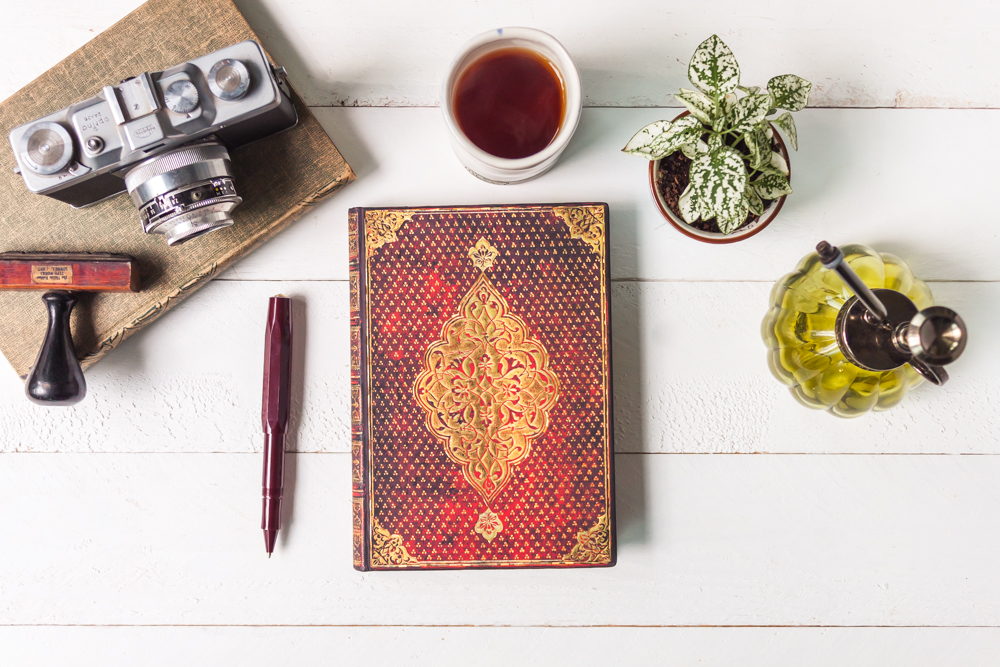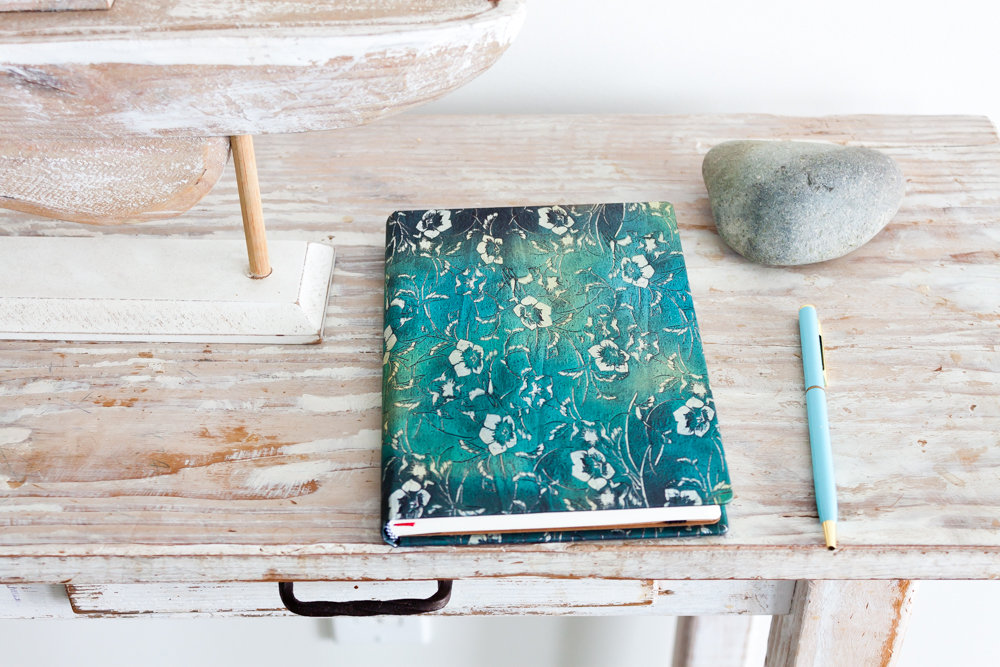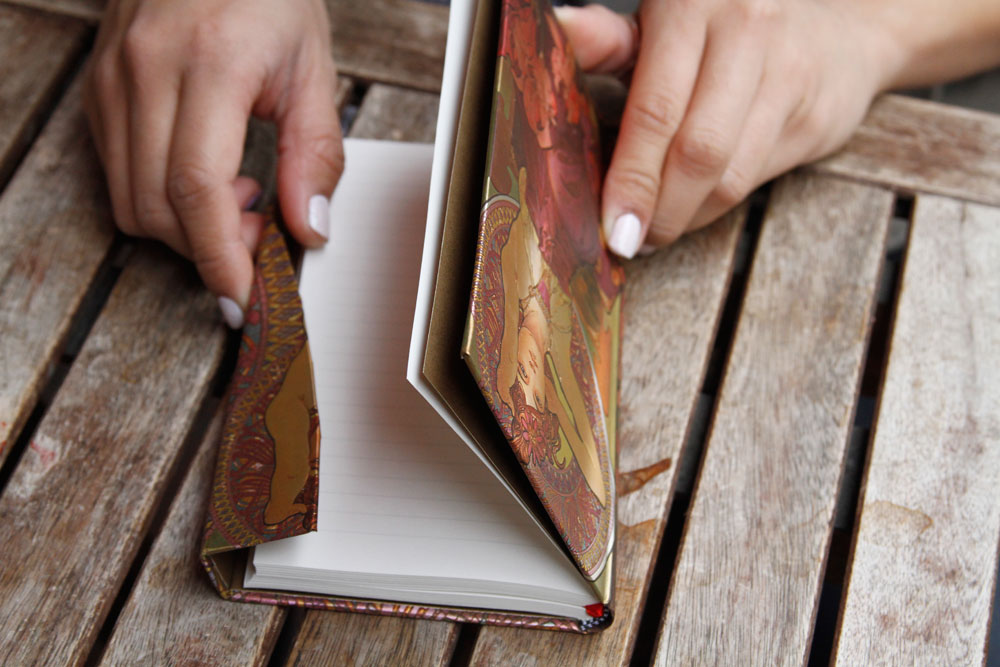After 30 years, you may assume we’ve mastered the art of journalling, when in reality we are constantly trying new tricks and learning new journalling methods. Like any endeavour or hobby, journalling can take some trial and error until you find the method that works best for you.
In celebration of our 30th anniversary year, we’ve rounded up our top 30 tips for getting the most out of your journalling experience. Whether you are new to the Paperblanks community or a longtime journaller, we hope these pieces of advice will help you take your journal to the next level!

- Create an art journal. Filling a notebook with doodles to process daily musings is a great way to express your creativity and work through emotions. You can even start by creating collages with images cut out of a magazine and gluing them on the pages of your journal and take it from there. The sky is the limit!
- Combine journalling with your other passions, such as gardening. Whether it’s documenting garden activities and results, drawing flower bed plans or recording observations, keeping a plant journal to write down even the subtle changes is a great way to preserve the journey as you look back on the evolution of your garden.
- Record your favourite meals and recipes. A recipe journal can help you jot down new ideas for meals, archive recently tried recipes, track the growth of your sourdough starter or document variations to that perfect blueberry galette. And if you are lucky enough to get that coveted recipe from Grandma, a journal is the perfect place to transcribe the family’s culinary jewels for safekeeping.
- Follow your dreams and motivations. From a healthier lifestyle to mindful practices to travel goals, a craft you want to master or a longtime dream career, write down the things you want to achieve and it will be easier to then follow through.
- Try freewriting. A classic journal style that creates space to ponder feelings, untangle moods, celebrate successes or vent complaints, freewriting is a loose unstructured form of writing in which you simply record everything that comes to mind without stopping to focus on conventions of grammar.
- Set a journalling goal. As with any new endeavour, practice makes perfect. So set aside some time, whether it’s first thing in the morning, on your lunch break or before bed, and make yourself write. It might seem awkward at first but you’ll be pleasantly surprised by how quickly it becomes a part of your routine.
- Get involved in the wider journalling community. Look up journal prompts online, ask your friends what they write about or read message boards like the Journaling Subreddit. And, of course, there’s always the #PeopleOfPaperblanks on Facebook and Instagram!

- Take the time to choose the best journal for you. There are so many journal sizes, interiors, bindings, closures and cover designs available that there truly is something for everyone. So if your first journal doesn’t inspire you, think about what features you wish it had (or didn’t have) and look for that in your next book. Whether you stay loyal to your favourite title or mix and match depending on your mood or journalling topic, look for the journal that speaks to you.
- Take your journal on the road. Next time you travel, take a small journal and pen with you to note any important landmarks or street names you come across and you will find that the act of writing them down will actually help you to remember. Journals are also great for storing transit maps and other important guides!
- Start with shorter entries. If the idea of trying to fill in an entire journal seems daunting, consider using an annual planner or snapshot journal instead. The smaller, daily entries make it easy to write down at least one thing about each day.
- Let off some steam. Think of this one as an anti-gratitude journal. Rather than writing down the things you are thankful for, write down what really ticks you off. Instead of fuming at that guy talking too loudly on the train, write down your experience. Unleashing like this can feel incredibly therapeutic, while also making for some engaging reading material down the line!
- Keep a “good times” tracker. Every day without fail before going to sleep, write something positive about that day, what you have accomplished and something you are looking forward to the next day. Jotting down a few things every night that you are looking forward to can have an enormous effect on your positive thinking. So however small, write it down!
- Put your self-care at the forefront. A great place to start is to think about what self-care and wellness means to you. What “me-time” activities do you really enjoy and always feel refreshed after? Brainstorm some ideas with a list of activities you can always refer back to in your journal. Self-care directly relates to three main areas – mind, body and soul – which is a useful way to categorize your habits.
- Focus on your physical health, too. Being held accountable is an important part of maintaining a fitness regimen. So if you aren’t working with a trainer who is keeping notes for you, bring a journal along to the gym so you can jot down your reps, sets and weights.

- Celebrate your personal wins. Documenting achievements is important to keep us motivated and moving forward, and a journal is the perfect place to celebrate those wins without feeling like we are bragging.
- Plan for the future. Although our journey through life may have many twists and turns, journalling can help us envision the future in order to cultivate optimism and establish goals and intentions. Putting our most impactful and meaningful goals in writing will remind us what we are working towards.
- Triage your many ideas. When inspiration strikes, simply start a new page for that idea and go back to whatever it is you’re supposed to be doing at the time. You can return to these ideas later to build on them or just let them percolate until you have time to start something new. This will not only build a little cache of great ideas for future you, but it will also alleviate the stress of trying to remember your tasks and accomplish them all at once.
- Move your career forward. A journal is a great place to list advice from your mentors or write down contacts that you don’t want to risk losing in cyberspace. You can also vent about your current situation (or make plans to change it) without risk of your employer getting wind, or reflect on the lessons you learn each day.
- Take time to reflect on the big picture. “Why am I really here?” and “What am I feeling and why do I feel it?” are not thoughts most people allow themselves to dwell on during a regular day, but really thinking about the answers to them is how we can begin to know our true selves. A journal is a great place to take the time to think about these ultimate truths, deepening your understanding of who you want to be and how you want to live your life.
- Develop your intuition. Writing a journal can help you develop your intuition, eliminating the second-guessing or overanalyzing of every decision you are faced with. A great way to work on this is to set aside time for stream-of-consciousness journal writing. Seeing the trends in what you write when you’re not judging yourself is a helpful tool to develop your intuition and know which voice to listen to when it comes to a tough decision.
- Work with templates. Think of some themes common to your journalling (e.g., daily reflections, quotes, goals) and work on a basic template for each. For example, you may find that a daily reflection entry calls for more drawings and symbols, while a goals page will be made up of decorative headers and bullet point lists.
- Illustrate your favourite quotes. Favourite quotes are popular journalling subjects because they offer a chance to express something that you feel without having to find the words. Take a quote that speaks to you and try to sketch it out. It could be a literal representation of what is being stated or a more symbolic depiction, but adding an artistic element will help deepen your interpretation and understanding of the words.

- Capture all the senses. Remember not only the key scenes from your travels, but use all five senses and record everything you experience – photos can capture a scene, but not its scent or sounds. You will find your memories of the trip that much deeper in the years to come.
- Create a special space. We all lead busy lives, but it’s important to carve out special time for journalling. Find a quiet space and set the mood for reflective writing with some incense, candles or a cup of tea.
- Make it a family affair. Journalling together can be a bonding experience. Enjoy spending time interviewing or drawing each other, leaving little notes for days to come or simply allowing your imagination to run wild.
- Use your journal as a tool to relax. Start with creating a designated relaxation page. This can be filled with quotes you love, goals you have, accomplishments, beautiful drawings, pictures of places you’d like to go or people you find inspiring. Images of peaceful scenes, names of songs you find relaxing…the possibilities are endless!
- Plan for the week ahead. Setting aside time to plan out various components of your week not only allows for fewer bumps as the week progresses but helps you to relax as you do it. For example, sitting down on a Sunday to plan out time for work, social events and meals you’d like to prep, as well as plotting out time for exercise and journalling, will help you to feel more positive and relaxed for the week ahead.
- Receive your own best advice. Writing out lists of pros and cons offers you a space to see both sides of a situation, without receiving unsolicited “helpful” advice.
- Write your own legacy. Our journals are made to last, so they can be treasured by future generations. By becoming the author of your own life story, you are in charge of making sure it’s told the way that feels most authentic to you.
- Have fun with it! As you can see from the list above, the possibilities are endless when it comes to your journal. The key is not to be intimidated by the blank page, and instead embrace the unknown. Dive in with your personal thoughts and creative urges, and don’t be afraid to try new styles of journalling until you find what works best for you!

What advice would you give to someone who is new to journalling and unsure where to start?





